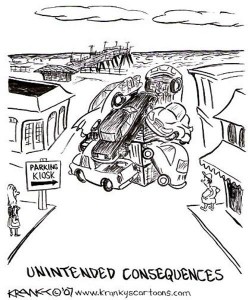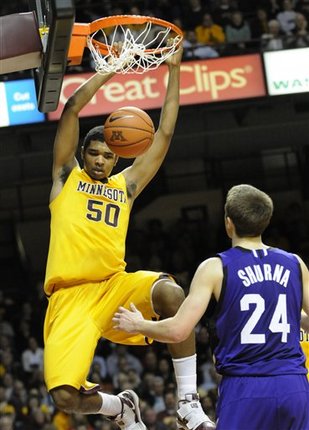Dissecting the Law of Unintended Consequences, Early Entry Style
Posted by rtmsf on May 9th, 2011Welcome to the law of unintended consequences, folks.
Starting with Jared Sullinger’s surprising decision to return to school in the aftermath of #1 Ohio State’s upset loss at the hands of Kentucky in the NCAA Tournament last month, a number of projected top draft picks have similarly shocked the world by deciding to stick around their college campuses for another season. Subsequent to Sullinger, Baylor’s Perry Jones — another top five pick — followed that up with his own shocker. Next, UNC’s Harrison Barnes and John Henson — both projected lottery picks this June — each decided that another year in Chapel Hill was to their liking. On Saturday, Kentucky’s Terrence Jones was the latest projected lottery pick to spurn guaranteed millions in favor of playing as an amateur for another season (ok, stop your snickering about the word “amateur”).
Counting up the number of lottery pick slots that opened up in the June draft, we come up with a total of five (of 14) and certainly the following early entrants will be this summer’s beneficiaries: Arizona’s Derrick Williams, Duke’s Kyrie Irving, Kentucky’s Brandon Knight, UConn’s Kemba Walker, and Kansas’ Marcus Morris. Five additional slots in the first round, though, isn’t the same as a floodgate opening, and we fear that the oft-repeated mantra of “weak draft” combined with a lack of an opportunity for players to get good evaluation feedback (thanks, ACC coaches!) has led to a bunch of poor decisions at the back end this year. Like we said, the law of unintended consequences.
A few of the names coming across the wires this weekend in advance of the deadline to withdraw from the NBA Draft on Sunday night were nothing short of head-scratchers. Notre Dame’s Carleton Scott? Kentucky’s DeAndre Liggins? Stanford’s Jeremy Green? Tennessee’s Scotty Hopson? Texas’ Cory Joseph? Minnesota’s Ralph Sampson, III? Surely these players — and we could dig deeper to add the likes of Washington State’s DeAngelo Casto, Kansas’ Josh Selby, Illinois’ Jereme Richmond, Louisville’s Terrence Jennings, and UCLA’s Malcolm Lee to the list if we like — realize that “weak draft” doesn’t mean that everybody who wants a slot in the first round gets one, right? Maybe not. Among this group of early entrants, not a single one dominated at this level, and in fact, the prevailing theme among many of them is that their collegiate careers were largely disappointing. A handful of these names have an outside shot at the bottom of the first round because of their athleticism (notably, Selby, Lee, and Liggins), not their skill sets, but by and large, none of these players are going to be happy with their draft selection on June 23 (second round or not at all).
What’s particularly interesting about this trend is how the specter of a prolonged NBA lockout hasn’t seemed to impact what we are suggesting are poor decisions. It would be reasonable to believe that a top pick like Derrick Williams or Kyrie Irving would be floated by his agent in the interim, secure in the guaranteed paychecks that will eventually arrive in the mailbox once the owners and players sort things out next year. But what about the others? Will an agent support Terrence Jennings or Carleton Scott for half a year or longer, secure in nothing of the sort? Keeping in mind that the 1998-99 NBA Lockout lasted over six months, and there’s a strong chance that this negotiation will approach that, what exactly are these players planning on doing in the meantime? Where do they plan on showing team GMs their worth without a summer league in which to do so? Is Europe the answer? That option was also going to be available next year. It just doesn’t make any sense — did any of these players so much as consider that possibility?
Our takeaway is this: If there’s anyone whom NBA labor troubles should have scared out of the upcoming draft, it should have been these marginal players, not the lottery picks. Yet, a disproportionate number of lottery picks decided to stick around, while many of those facing a most uncertain uphill battle decided to come out. Go figure.












































